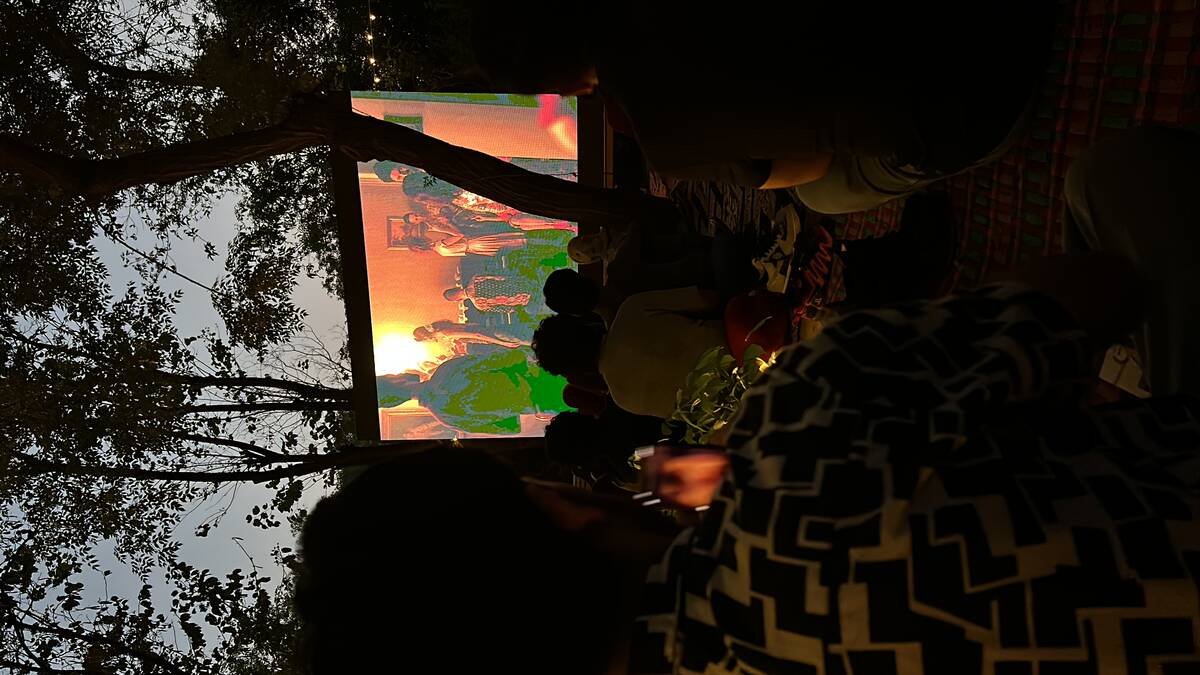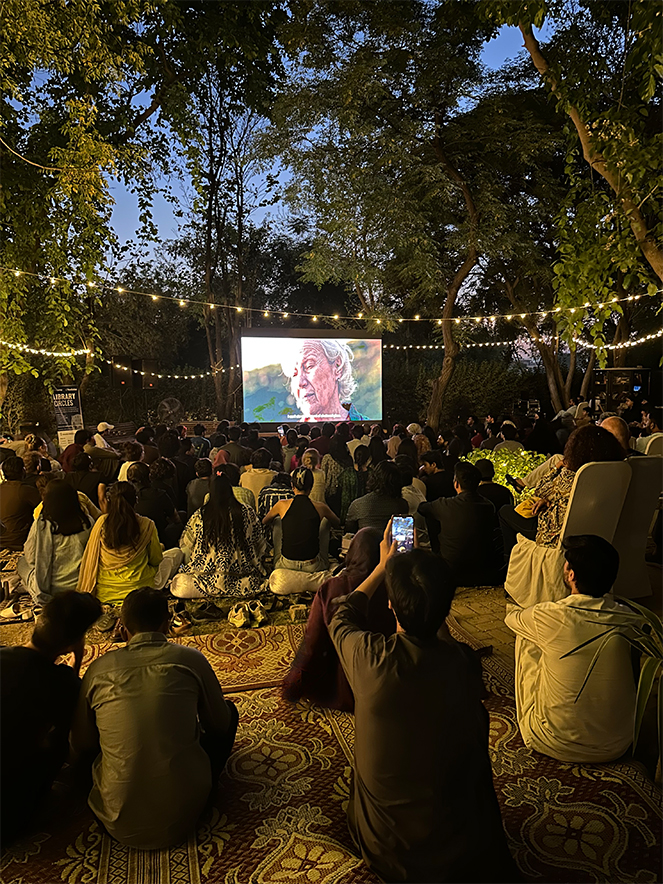DUBAI: Celebrities from Hollywood and across the globe are speaking on the increased military escalation in Gaza, the latest being British actor and Oscar-winner Riz Ahmed.
Ahmed, who is of Pakistani descent, took to Instagram to say there are “no two sides” to current events in Gaza, but only “the side of humanity,” and pleaded for an “end to the indiscriminate bombing of Gaza’s civilians.”
“What happened in Israel last week was horrific and wrong. The pain and fear so many are feeling is deep, and real,” he wrote, referring to Oct. 7’s attack by Hamas.
“What’s happening in Gaza now, and has been happening in Palestine under the Occupation for decades, is horrific and wrong. The depth and reality of this suffering cannot be ignored. If we look in only one direction, we will go even into darkness,” he continued.
“But that is exactly what is happening right now. We are being asked to look away while the civilians of Gaza, half of them children, are running out of time. If we are on the side of humanity, we must urgently speak up to try and avert the loss of innocent life. This means calling for an end to the indiscriminate bombing of Gaza’s civilians and vital infrastructure, the denial of food, water, and electricity, and the forced displacement of people from their homes. These are morally indefensible war crimes.”
US actor John Cusack took to X, the social media platform previously known as Twitter, to show his support for Palestine, saying, “Palestinian civilians didn’t ask for a massacre.”
“I was out at the Palestinian march in Chicago. I’ll tell you what I didn’t hear; I didn’t hear death to Israel, I didn’t hear death to Jews, I didn’t hear people celebrating the murders of Israeli civilians. What I DID hear is - we must free Palestine from a brutal occupation - people concerned for their loved ones, in a hell zone, stuck without food, water and power. Deep anguish over people being told to leave and bombed as they left,” wrote Cusack.
US Egyptian actor-filmmaker Ramy Youssef also took to Instagram to share his heartfelt thoughts as he shared images of Palestinian and Israeli artists and creators he’s worked with.
“These are some of the most beautiful artists I know. I’m scared for them, and I always have been. we were in Palestine together when Shireen Abu Akleh was murdered— an American journalist in a press vest, killed by a soldier. some of our crew had worked with her. I remember the panic in their faces. I remember how there was never any legal recourse for her murder. there never is. they have witnessed decades of human-rights violations and children killed. I am horrified at what has happened to Palestinian lives. I am horrified at what has happened to Israeli lives. I have spent so much of my adult life praying for everyone in the region. praying for my PTSD-filled Muslim and Jewish sisters and brothers around the world— as well as Christians there and beyond,” he wrote as part of his long caption.
Youssef also called for an end to the violence in Gaza. “There are hostages and dead bodies and Gaza is on the brink of being destroyed. Entire generations of families. These are civilians with no recourse and nowhere to go. a million people are being asked to evacuate to nowhere. The people of Gaza do not deserve to pay the price for our failings. If Gaza is erased, history will see we stood by. that we failed to find our humanity,” he continued.
Responding to Youssef, Marvel superstar Mark Ruffalo, known for playing Hulk in the “Avengers” films, wrote in the comments, “I was just thinking, there are very few celebrities speaking on this issue who have the lived experience and knowledge that you do. You have worked there and spent time there. You hold all these people dear and you are a man of such humanity and quality. Your voice, your life, your work, your love and your genuine care are so important in this chaotic and passionate moment. You have so much to offer to this conversation in and informed and insightful way. It is so needed in this moment. Thank you again, Ramy. I’m so proud to know you,” wrote Ruffalo.
British comedian and political commentator John Oliver took a moment on his “Last Week Tonight” cold open to also address the humanitarian crisis.
“I don’t know where things stand in Gaza as you watch this right now, but all signs seem to be pointing toward a humanitarian catastrophe,” said Oliver.
And he directed his anger toward “the zealots and extremists across the board who’ve consistently thwarted attempts at peace over the years. Israelis and Palestinians have been let down by their leadership time and time again, and I don’t have a great deal of faith in the leaders currently in charge to steer us toward peace.”
US singer-songwriter Kehlani also spoke at a pro-Palestine rally held in Downtown Los Angeles on Saturday, where she said there was nothing complicated about taking a public stance on the matter. “I think it’s black and white, and you have a choice to see it or not… I want all my followers and peers to sit on the right side of history. I want them to make a decision that is larger than them. I want them to make an unselfish one. I want them to make an obvious one. And I just hope they choose to do the right thing. Imma keep reiterating that it’s not that complicated of a decision to make.”
Several Hollywood celebrities have also spoken in support of Israel including Jamie Lee Curtis, Natalie Portman, Justin Bieber, Liev Schreiber, Debra Messing and Amy Schumer.
Some of them even found themselves making mistakes amid the conflict: Singer Bieber posted a photo of destruction in Gaza with the caption “praying for Israel” before taking it down without addressing the error.
Actress Jamie Lee Curtis deleted a photo she posted of Palestinian children in Gaza with an Israeli flag in a caption reading “terror in the skies” — she has not addressed the mistaken image at the time of publishing.
On Oct. 9, Natalie Portman, who was born in Jerusalem, shared a statement on Instagram, writing, “My heart is shattered for the people of Israel. Children, women and the elderly have been murdered and abducted from their homes. I am in horror at these barbaric acts and my heart is pounding with love and prayer for the families of all affected.”
Star Wars actor Mark Hamill – who posted a picture of the American and Israeli flags side by side, captioning the post, “America stands with Israel” – later took to Instagram to repost a comment by US-Dutch-Palestinian supermodel Gigi Hadid.
“My thoughts are with all those affected by this unjustifiable tragedy and every day that innocent lives are taken by this conflict – too many of which are children,” wrote Hadid, whose father is Palestinian.
“I have deep empathy and heartbreak for the Palestinian struggle and life under occupation, it’s a responsibility I hold daily.
“I also feel a responsibility to my Jewish friends to make it clear, as I have before: while I have hopes and dreams for Palestinians, none of them include the harm of a Jewish person.”
US-Iraqi beauty moguls Huda and Mona Kattan took to Instagram to express their solidarity with the Palestinians.
“It’s the first time we experience a tragedy at this magnitude, so graphic via social media. Witnessing an entire population getting destroyed in real time is so devastating,” Mona wrote, referring to Israel’s bombardment and siege of Gaza.
Meanwhile, Huda, founder of cosmetics brand Huda Beauty, found herself in the midst of a social media storm. She faced fierce backlash and calls for a boycott of her products after posting a series of photos and videos highlighting the humanitarian crisis in occupied Palestine.

Swedish pop singer Zara Larsson posted a story on her Instagram, suggesting a double standard in international responses to the conflicts in Ukraine and Palestine.
“Oh so it’s stand with Ukraine when Russia invades but not Palesti-” she captioned her photo.
The singer has been vocal about her support for the Palestinian cause over the years, and has posted several stories over the week addressing the humanitarian situation in Gaza.





















